Article 89: Coffee – a great source of energy for body, spirit, and mind
Occupying an important position in human society over the past 12 centuries, coffee urges scientists to constantly research and elucidate the value of this special energy source.
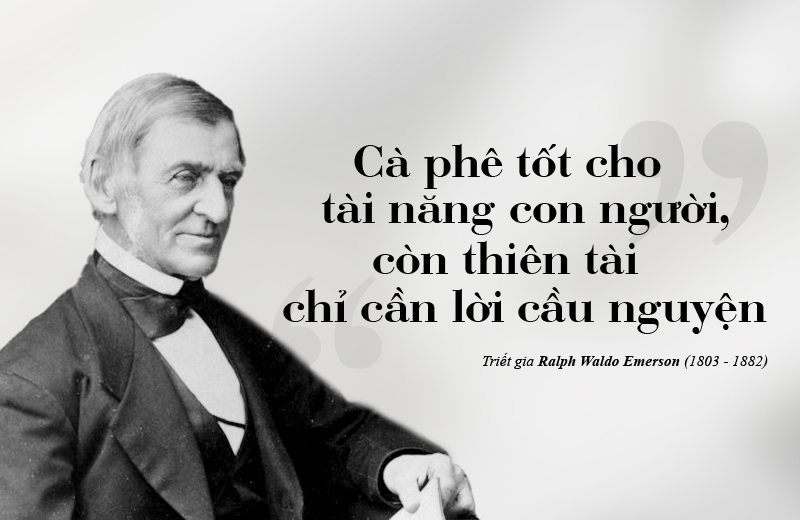
“Coffee is good for talent, but genius wants prayer” – Philosopher Ralph Waldo Emerson (1803 – 1882)
Intelligence sublimation catalyst
As soon as it was discovered in Ethiopia in the 9th century, coffee was considered an elixir, providing special energy to help refresh the spirit, stay awake all night and all morning for prayer sessions. By the 15th century, coffee followed in the footsteps of pilgrims spreading throughout the Muslim world and was seen as a kind of energy to help keep people awake and easily generate new ideas. In particular, coffee is likened to “Milk of chess players and thinkers”. The first coffee shop in Istabun in the 16th century was then called “Mekteb-I ‘irfan” – a school of knowledge, providing and disseminating new ideas.
By the 17th century, coffee was introduced to Europe, continuing to promote its value and medicinal power as a catalyst for creativity, intellectual sublimation, bringing alertness to help maximize drinkers’ potential productivity and frequency of work. Coffee gradually replaced beer in European society, became a drink that promoted creative thinking during the European Enlightenment and was promoted as a drink that helped people unchain themselves and created their own freedom. Not only that, over the centuries, many great men of humanity, regardless of religion, politics, class… such as the politician Napoleon Bonaparte, the thinker Voltaire, the philosopher Jean-Jacques Rousseau, philosopher Pietro Verri, musical genius Wolfgang Amadeus Mozart, great writer Johann Wolfgang von Goethe…all found coffee as an indispensable source of awakening energy in their lives and careers.
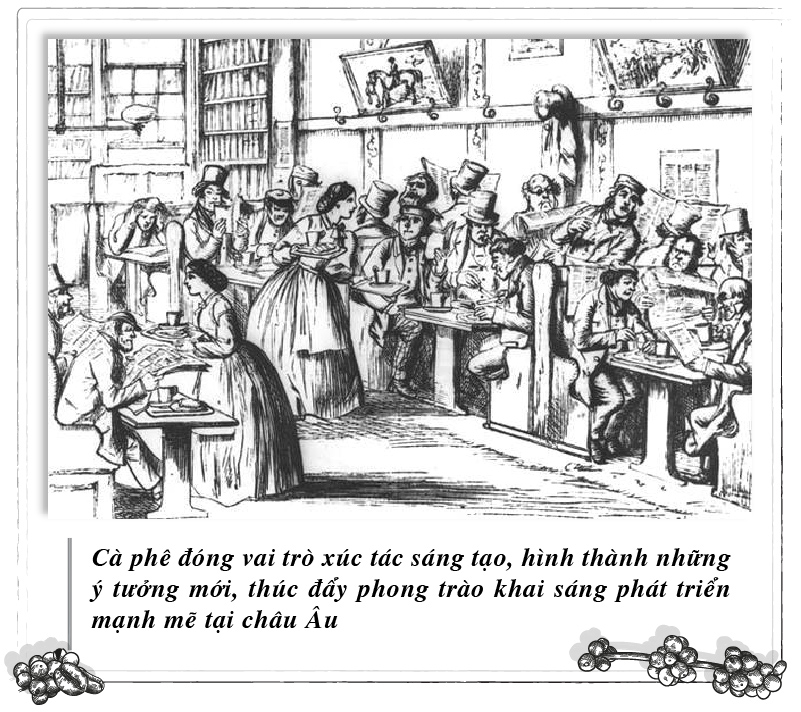
Coffee played the role of a creative catalyst, forming new ideas, promoting the flourishing enlightenment movement in Europe.
Strongly pervasive and occupying an important position in human society, coffee attracts scientists in many fields of research to decipher the special energy source hidden in this seed. The pharmacological values of coffee handed down through experience from the first days of its appearance were gradually recorded in writing by scientists, doctors, philosophers, historians such as Rhaze, Avicenna Bukhara, Leonhard Rauwolf, Philippe Sylvestre Dufour… for centuries. However, it was not until the beginning of the 19th century, with the development of scientific and experimental medicine in the West, the German chemist Friedlieb Ferdinand Runge (1794 – 1867) analyzed and discovered for the first time coffee’s key ingredient Caffeine in 1819. Runge called Caffeine “Kaffebase”, meaning a foundation that exists in coffee. Since then, caffeine has been the most widely known and most studied component of coffee.
Following Runge’s research, Caffeine continues to be researched and proven to have an impact on the central nervous system, brain, and spinal cord, stimulating gas exchange, enhancing myocardial activity, dispelling fatigue in the muscles, providing alertness, focus and allowing the body to function more efficiently. According to research by Allers and Freud in 1925, coffee with caffeine is a source of energy for the brain, increasing alertness, awareness and reaction speed, helping to acquire knowledge effectively as well as promoting the reproduction of knowledge by new images and ideas.
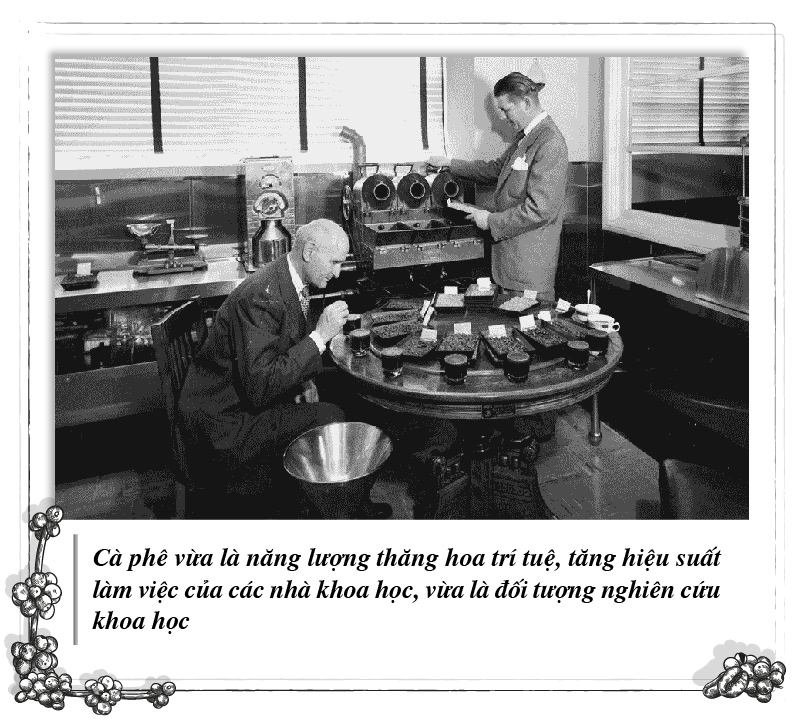
Coffee is both an intellectual sublimation energy, increasing the work performance of scientists, and an object of scientific research.
According to scientific studies, the stimulating, euphoric and creative properties of coffee come from the mechanism of caffeine’s action on the body through nerve reactions. When drinking coffee, caffeine will circulate in the blood, taking the place and negating the effect of Adenosine – a chemical that follows a natural biological mechanism that causes drowsiness, sleepiness, and slows down nerve activity as well as blocking the release of positive emotional substances in the brain, keeping the body awake. At the same time, the caffeine in coffee stimulates the body to produce Adrenaline – a hormone that creates excitement, at the same time, blocks the activity of Phosphodiesterase enzyme, helping to amplify and maintain the euphoric effect caused by Adrenaline in the brain. In addition, caffeine also blocks the process of breaking down Dopamine – a neurotransmitter that creates a feeling of euphoria and happiness, so that the body maintains more “motivational” substances to last longer.
With a strong impact on the human brain thanks to its caffeine content, coffee is considered a catalyst for creative ideas and intellectual sublimation. American scientist Steven Johnson in his book Where Good Ideas Come From: The Natural History of Innovation says “the age of reason accompanies the rise of caffeinated beverages.”
Great source of energy for a healthy body
With more than 8,000 studies over the past 40 years, coffee has been proven to be a complex mixture of thousands of different chemicals, including carbohydrates, lipids, nitrogen compounds, vitamins, minerals, alkaloids (including Caffeine, Trigonelline) and phenolic compounds. The pharmacological effects of these compounds on human health are of increasing interest as coffee is widely consumed and becomes an integral part of human daily life.
Among which, the main ingredient caffeine is focused for not only affecting the brain but also having an effect on circulation and increasing muscle strength. According to the results of research by American physiologist Horatio Wood: “Caffeine not only enhances the strength of muscle contractions but allows the body to function more efficiently with the same expenditure of energy.”
In particular, containing a large amount of antioxidants, more than tea, fruits and vegetables, including Polyphenols, Hydrocinnamic Acid, Alkaloid Trigonelline, Melanoidin… coffee has the ability to neutralize free radicals, inhibit the absorption of fatty substances of the intestine, blocking receptors associated with abnormal heart rhythms, reducing the risk of cardiovascular disease and stroke. This is completely different from the popular notion that still exists today that drinking a lot of coffee makes the heart beat faster, also known as arrhythmia. Many countries such as the United States, Italy, Spain, and Norway have considered coffee as the number one source of dietary antioxidants. The antioxidant compounds in coffee have also been studied to reduce oxidative stress and inhibit damage to cells that can cause cancer and other diseases such as heart disease, liver disease, Parkinson’s disease, Alzheimer, and type II diabetes.
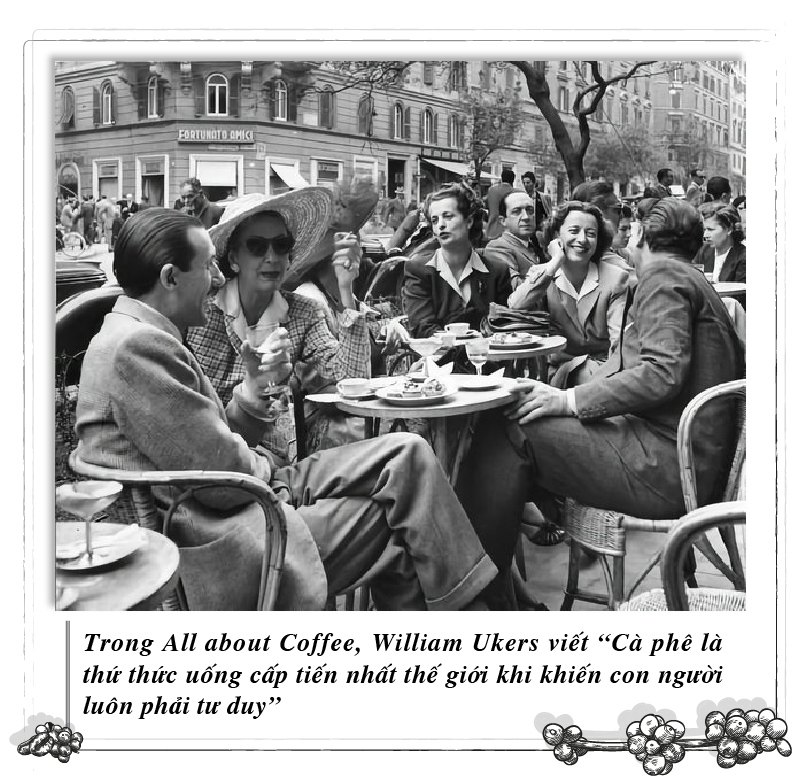
In All about Coffee, William Ukers writes “coffee has been the world’s most radical drink in that its function has always been to make people think”
Besides, with ingredients containing many minerals and vitamins, such as Manganese, Potassium, Magnesium, Phosphorus, Folate, Vitamin B1, Vitamin B2, Vitamin B3, Vitamin B5…, coffee is an essential nutritional supplement for the body, helps in energy metabolism and strengthens the immune system. According to a study published in the journal Nutrients in 2021, coffee as part of a diet and nutrition helps reduce the risk of Covid-19. Specifically, drinking one or more cups of coffee a day reduces the risk of infection by up to 10%.
Many long-term studies conducted in Finland and the US show that daily coffee drinkers have a lower risk of depression than non-coffee drinkers. This makes a lot of sense in the context of many people suffering from post-Covid-19 depression. This is because caffeine has the effect of releasing neurotransmitters such as Dopamine and Serotonin, which help to elevate emotions. At the same time, antioxidant compounds help reduce inflammation of neurons in the part of the brain that causes depression.
The charm of coffee to mankind is not only because of its unique taste but also its wonderful aroma. Along with stimulating the taste buds, the aroma of coffee is used as a healing medicine that has been handed down in the world for thousands of years and is confirmed by scientific bases. In the Mediterranean region, medical scientists have extracted the essential oil of coffee and used in aromatherapy. This was originally a treatment method considered by the Greeks and Romans to be the “healing power of nature”. To date, aromatherapy is considered the art of improving quality of life and has been recognized in the fields of science and medicine.
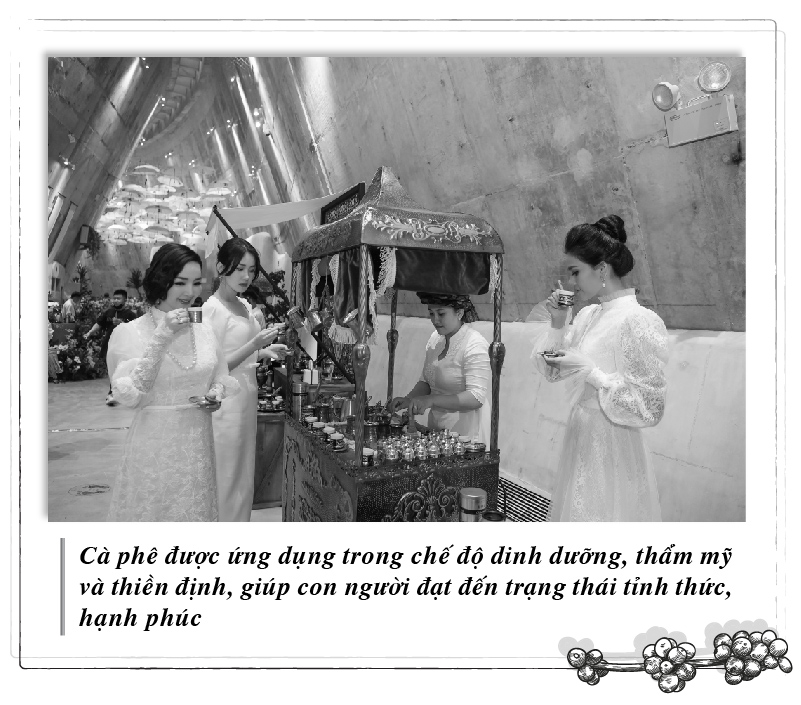
Coffee is applied in nutrition, aesthetics, and meditation, helping people reach a state of awakening and happiness.
According to the results of many studies coming from scientists around the world such as Harvard School of Public Health, University of California Davis Coffee Center, National Institutes of Health (USA), University of Navarra (Spain), Ruhr University (Germany), Seoul National University (Korea)… the aroma of coffee has the effect of regulating mood, cognitive performance, brain waves, heart rate, blood pressure to create change in pharmacological, physiological and psychological states. Smelling coffee has a positive effect on mental state and cognition, reducing symptoms of stress and depression. Coffee essential oil also becomes one of the therapies of Aromatherapy, helping to improve physical, mental, and spiritual health.
Coffee not only has a positive effect on the activities taking place inside the body, it is also considered a natural beauty method. Thanks to Flavonoid antioxidants, coffee helps to soothe irritated skin, prevent sunburn, and fight skin aging. The caffeine content in coffee dilates the blood vessels underneath the skin, improving blood circulation, which is the key to reducing cellulite, making the skin smooth. At the same time, the antioxidants, especially the Chlorogenic Acid in coffee, work to reduce inflammation and protect healthy skin.With incredible pharmacological characteristics, increasingly elucidated by modern scientific research evidence showing the positive effects of coffee on cognitive performance, physical performance, and emotional well-being of human beings. With a different – special – unique vision, since the beginning of its foundation, Trung Nguyen Legend considers coffee as a source of awakening and creative energy for people. During more than 26 years of development, Trung Nguyen Legend has constantly researched the value of coffee in all areas of social life and strives to build an ecosystem of Coffee Lifestyle – Successful Lifestyle – Mindful Lifestyle, creating a prosperous future and comprehensive happiness in Body – Spirit – Mind for the community.
Readers are cordially invited to watch the series of Coffee Tao videos posted on https://bit.ly/caphetrietdao
THE REAL COFFEE
ROASTED ONLY FOR PEOPLE OF WISDOM!
Source: “The Philosophical Way of Coffee” – copyright by Trung Nguyen Legend
Coming up: Coffee shops and the pursuit of authentic happiness


